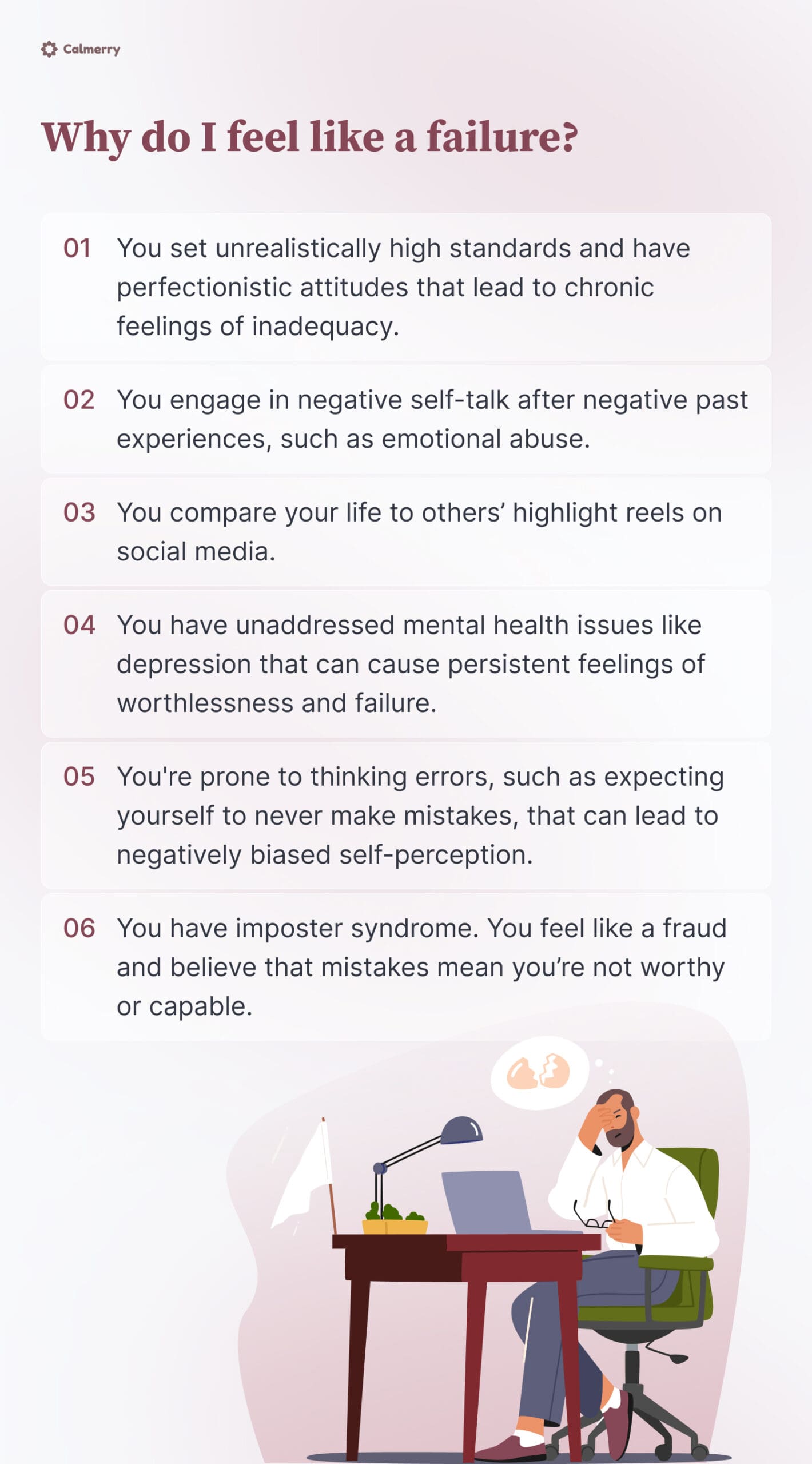Why Do I Feel Like a Failure? How Can I Stop Feeling This Way?

In this article
Making mistakes or falling short of a goal never feels good, but we’ve all experienced these setbacks from time to time. For some of us, though, falling short of perfection makes us feel as if we’ve failed.
It’s normal to feel let down when you don’t meet your goals. But if you chronically feel like a failure, there may be some underlying problems to address.
There are 6 common reasons that can lead to feeling like a failure. The good news is that you can work through them.
Understanding the roots of feeling like a failure
When you get stuck in a cycle of feeling like a failure, there are usually some underlying reasons. These feelings may stem from past experiences or unaddressed mental health problems.
We’ll discuss these in more detail below.
1. Perfectionism and unrealistic expectations
Research suggests that people with perfectionistic attitudes are prone to being highly critical of themselves when they fail to meet their performance standards. [1] Overholser, J., & Dimaggio, G. (2020). Struggling with perfectionism: When good enough is not good enough. Journal of Clinical Psychology, 76(11), 2019–2027. https://doi.org/10.1002/jclp.23047
So, if you’re struggling with feeling like a failure, you may be holding yourself to unrealistic standards. If you always expect perfection, you’ll never measure up to the expectations you have for yourself.
People who struggle with perfectionism tend to judge themselves only in terms of their achievements, and they set the bar unrealistically high.
Since they can never realistically achieve everything they expect of themselves, they will always feel like they’re falling short.
2. Past experiences and negative self-talk
If you’ve had negative past experiences, especially those related to abuse or neglect, you may be prone to negative self-talk. [2] Mansueto, G., Cavallo, C., Palmieri, S., Ruggiero, G. M., Sassaroli, S., & Caselli, G. (2021). Adverse childhood experiences and repetitive negative thinking in adulthood: A systematic review. Clinical Psychology & Psychotherapy/Clinical Psychology and Psychotherapy, 28(3), 557–568. https://doi.org/10.1002/cpp.2590 Perhaps you were subjected to emotional abuse growing up.
Over time, your self-talk probably became quite negative. It’s unfortunately easy to start to internalize the negative things people say about us.
It’s possible that your feeling of being a failure stems from an overall negative view you have toward yourself. The voice inside your head might tell you that you’re not good enough, or that you’re falling short of what everyone expects of you.
– Dr. Jenni Jacobsen, PhD, Licensed Social Worker (LSW), mental health writer
3. Comparison and social media
It’s true what they say: comparison really can be the thief of joy. If you compare your own life to the highlight reels you see on social media, you might feel pretty down about yourself.
Research has shown that people who fall victim to social media comparison via Facebook tend to have lower self-esteem when compared to those who show lower levels of social comparison. [3] Vogel, E. A., Rose, J. P., Okdie, B. M., Eckles, K., & Franz, B. (2015). Who compares and despairs? The effect of social comparison orientation on social media use and its outcomes. Personality and Individual Differences, 86, 249–256. https://doi.org/10.1016/j.paid.2015.06.026
If you’re spending a significant amount of time on social media platforms, your feelings of being a failure may result from comparing yourself to others.
4. Unaddressed mental health issues
Sometimes, an underlying mental health problem can explain the feeling of being a failure. For example, feelings of worthlessness and inappropriate guilt are diagnostic symptoms of depression. [4] Substance Abuse and Mental Health Services Administration (US). (n.d.). Table 9, DSM-IV to DSM-5 Major Depressive Episode/Disorder Comparison – DSM-5 Changes – NCBI Bookshelf. https://www.ncbi.nlm.nih.gov/books/NBK519712/table/ch3.t5/
So, if you struggle with depression, your feelings of failure might be related to the features of this mental health condition. Researchers have found that negative thinking patterns can cause depressive symptoms to persist over time. [5] Beevers, C. G., Mullarkey, M. C., Dainer-Best, J., Stewart, R. A., Labrada, J., Allen, J. J. B., McGeary, J. E., & Shumake, J. (2019). Association between negative cognitive bias and depression: A symptom-level approach. Journal of Abnormal Psychology, 128(3), 212–227. https://doi.org/10.1037/abn0000405
The bottom line is that depression can be linked to feeling like a failure. Furthermore, this type of thinking can, unfortunately, create a vicious cycle, in which feelings of failure cause depression symptoms to worsen.
And, as depression persists, the feeling of being a failure is likely to continue.
5. Thinking errors
Even if you don’t have a specific mental health condition, you might be prone to thinking errors. Thinking errors occur when we tend to think about the world and ourselves in biased or illogical ways.
Sometimes, we can be biased toward the negative, especially when it comes to ourselves. This means we can be prone to viewing ourselves in a harshly negative fashion.
For instance, we might expect ourselves to never make a mistake, when we would never hold other people to such a high standard. So, feeling like a failure might be a result of thinking errors that lead to negatively biased thinking about ourselves.
6. Imposter syndrome
Imposter syndrome occurs when people view themselves as frauds. [6] Gresham-Dolby, C. (2022). Imposter syndrome: An opportunity to positively influence mentees. Currents in Pharmacy Teaching and Learning, 14(2), 130–132. https://doi.org/10.1016/j.cptl.2021.11.019 This tends to occur in high-achieving people who believe that mistakes mean they aren’t worthy or capable.
When you’re feeling like a failure, it might be because of imposter syndrome. You feel that a mistake means you haven’t lived up to the expectations and you’ve failed to fulfill your role.
Imposter syndrome also typically involves a belief that you have achieved great things only out of luck and a fear that others will find out you’re a fraud.
If you experience imposter syndrome, you may even have the feeling of “I don’t know who I am” each time you make a mistake. If your mistakes make you feel you aren’t capable, you may lose your entire sense of identity.

The impact of feeling like a failure
Constantly feeling as if you’re a failure doesn’t typically have a positive effect on your mental health. In fact, ongoing feelings of failure can be quite distressing and lead to mental health problems.
Some of the impacts of feeling like a failure include:
- Poor self-esteem and feelings of self-doubt
- Feelings of worthlessness
- Being overly critical of yourself
- Never feeling “good enough”
- Withdrawing from others because of feeling inadequate
- Ruminating over mistakes
- Working yourself to the point of burnout to achieve perfection
- Increased risk of mental health problems, which could include depression, suicidal thinking, and PTSD [2] Mansueto, G., Cavallo, C., Palmieri, S., Ruggiero, G. M., Sassaroli, S., & Caselli, G. (2021). Adverse childhood experiences and repetitive negative thinking in adulthood: A systematic review. Clinical Psychology & Psychotherapy/Clinical Psychology and Psychotherapy, 28(3), 557–568. https://doi.org/10.1002/cpp.2590
Strategies to overcome feelings of failure
The good news is that you can learn strategies to overcome ongoing feelings of failure. When you learn to change your thinking patterns, you’ll stop ruminating over your shortcomings.
Consider the strategies below.
1. Challenging negative self-talk
All of us are prone to automatic negative thoughts from time-to-time. These are thoughts that just pop into our heads without much effort.
Automatic negative thoughts might include telling yourself that you’re a failure or that you’ll never be good enough.
Rather than accepting these negative thoughts as they pop into your head, decide to challenge them. Perhaps you’ve made a small mistake today, but you’ve certainly had many prior successes in your life.
Rather than telling yourself that you’re a failure, challenge yourself to think something along the lines of, “I made a mistake today, but I can learn from it and succeed in the future.”
2. Setting realistic goals and expectations
It’s only natural to have goals for yourself, but you cannot expect perfection. This simply isn’t realistic, and it tends to lead to a host of psychological problems.
Instead of expecting perfection from yourself, expect excellence in areas that are important to you. You can set high goals for yourself in your highest-priority areas, but give yourself plenty of time to reach these goals.
– Dr. Jenni Jacobsen, PhD, Licensed Social Worker (LSW), mental health writer
Work toward them in small steps, and make sure you don’t have too much on your plate at once.
In other areas of life, outside of your top priorities, try to get comfortable with the idea of being “good enough.” For instance, if you’re trying to commit to an exercise routine, don’t expect yourself to be in the gym for hours a day.
If that’s not realistic for you, commit to three days of exercise per week, or simply take a walk after dinner. Settling for “good enough” in some areas of life can take off a lot of the pressure that leads to feelings of failure.
3. Embracing a growth mindset
When you maintain a fixed mindset, you’re more vulnerable to feeling like a failure. If you have a fixed mindset, you feel that your talents and abilities are predetermined and cannot be changed.
On the other hand, a growth mindset believes that abilities can be developed. If you tend to show a fixed mindset, try to embrace the idea of a growth mindset.
Rather than viewing your abilities as fixed, recognize that you can strengthen your skills over time. So, failure doesn’t need to be seen as an endpoint. Instead, it’s just one part of the journey toward success.
– Dr. Jenni Jacobsen, PhD, Licensed Social Worker (LSW), mental health writer
Psychologists have found that a growth mindset can foster greater resilience and achievement, so this way of thinking could actually lead you closer to your goals. [7] Yeager, D. S., & Dweck, C. S. (2020). What can be learned from growth mindset controversies? American Psychologist/the American Psychologist, 75(9), 1269–1284. https://doi.org/10.1037/amp0000794
4. Learning from setbacks and challenges
When you struggle with feeling like a failure, it might be because you’re convinced you should never make mistakes or experience setbacks. This isn’t a realistic way of thinking.
We all experience setbacks and challenges. Rather than viewing setbacks as a failure, recognize that they are just part of the process.
Consider what you can learn from a setback, rather than fixating on how you’ve failed.
5. Celebrating small wins and progress
You might think that you only deserve to celebrate huge accomplishments, but it’s okay to be proud of yourself, even for small wins.
When you recognize even small accomplishments, you’ll begin to notice more of your successes. This can help you to get out of a pattern of negative thinking.
If you’re working toward a goal, such as graduating from a master’s degree program, allow yourself to celebrate the completion of each semester. Or, reward yourself for making it through a tough class.
6. Practicing self-compassion and self-care
The sad truth is that we tend to have less compassion for ourselves than we do for others. Those of us who struggle with feeling like failures would never hold our loved ones to the same standards to which we hold ourselves.
Overcome feelings of failure by practicing kindness and compassion for yourself. Recognize that everyone makes mistakes, even those of us who are talented, capable, and qualified.
If you’re having a hard time being compassionate, think about what you’d say to a close friend or family member in your situation.
Would you tell them they’re nothing but a failure? Absolutely not!
So, don’t talk to yourself like that either. Give yourself permission to be human, and if you’re struggling with negative thoughts, make some time for self-care.
Engage in hobbies you enjoy, prioritize rest and relaxation, and care for yourself through physical movement.
7. Surrounding yourself with supportive people
Having a supportive network in your corner is essential. People who support you and your goals and dreams can be a voice of reason when you’re feeling down on yourself.
When you’re struggling with negative self-talk, there is no shame in reaching out to a friend or family member and sharing your feelings. Chances are that they can offer words of encouragement and understanding.
When to seek professional help
You can practice self-help strategies to overcome feelings of failure, but sometimes, you might need professional support.
We can all get caught up in negative self-talk from time to time, but if it’s persistent and doesn’t improve with the strategies above, it might be time to seek professional help.
If your sense of feeling like a failure has become chronic and unmanageable, you might benefit from working with a counselor or therapist.
Some signs that it’s time to seek help include:
- Feelings of failure are making it hard for you to enjoy life
- You’re unable to be productive at work or school because you’re so caught up in negative self-talk
- It’s difficult for you to focus on anything but your feelings of inadequacy
- You have begun to withdraw from relationships and social engagements
- Your negative thoughts toward yourself are starting to interfere with your mental health (ie: you have ongoing feelings of sadness, significant anxiety, or thoughts of suicide)
If you are struggling to manage feelings of failure on your own, reaching out for therapy is a good next step. A therapist can help you process your feelings, challenge negative thinking patterns, and set realistic goals for yourself.
Once you make the decision to seek professional support, you might consider online therapy. This allows you to connect with a professional from the comfort and convenience of home!
A word from Calmerry
If you’re struggling with persistent feelings of failure, Calmerry therapists are here to help.
They offer compassionate, expert guidance to help you uncover the root causes of these feelings and develop strategies to build a more positive and resilient mindset.
Start with a brief survey – and we will match you with one of them within 1 hour.
You are not alone!
Overholser, J., & Dimaggio, G. (2020). Struggling with perfectionism: When good enough is not good enough. Journal of Clinical Psychology, 76(11), 2019–2027. https://doi.org/10.1002/jclp.23047
Mansueto, G., Cavallo, C., Palmieri, S., Ruggiero, G. M., Sassaroli, S., & Caselli, G. (2021). Adverse childhood experiences and repetitive negative thinking in adulthood: A systematic review. Clinical Psychology & Psychotherapy/Clinical Psychology and Psychotherapy, 28(3), 557–568. https://doi.org/10.1002/cpp.2590
Vogel, E. A., Rose, J. P., Okdie, B. M., Eckles, K., & Franz, B. (2015). Who compares and despairs? The effect of social comparison orientation on social media use and its outcomes. Personality and Individual Differences, 86, 249–256. https://doi.org/10.1016/j.paid.2015.06.026
Substance Abuse and Mental Health Services Administration (US). (n.d.). Table 9, DSM-IV to DSM-5 Major Depressive Episode/Disorder Comparison – DSM-5 Changes – NCBI Bookshelf. https://www.ncbi.nlm.nih.gov/books/NBK519712/table/ch3.t5/
Beevers, C. G., Mullarkey, M. C., Dainer-Best, J., Stewart, R. A., Labrada, J., Allen, J. J. B., McGeary, J. E., & Shumake, J. (2019). Association between negative cognitive bias and depression: A symptom-level approach. Journal of Abnormal Psychology, 128(3), 212–227. https://doi.org/10.1037/abn0000405
Gresham-Dolby, C. (2022). Imposter syndrome: An opportunity to positively influence mentees. Currents in Pharmacy Teaching and Learning, 14(2), 130–132. https://doi.org/10.1016/j.cptl.2021.11.019
Yeager, D. S., & Dweck, C. S. (2020). What can be learned from growth mindset controversies? American Psychologist/the American Psychologist, 75(9), 1269–1284. https://doi.org/10.1037/amp0000794
-
Learn morePersonalized online therapyChoose video, messaging, or both to fit your schedule and comfort. Get matched with your therapist within 1 hour.
-
Learn moreOne 60-minute live video sessionSee how online therapy works and get quick support with a single therapy session. No commitments.



